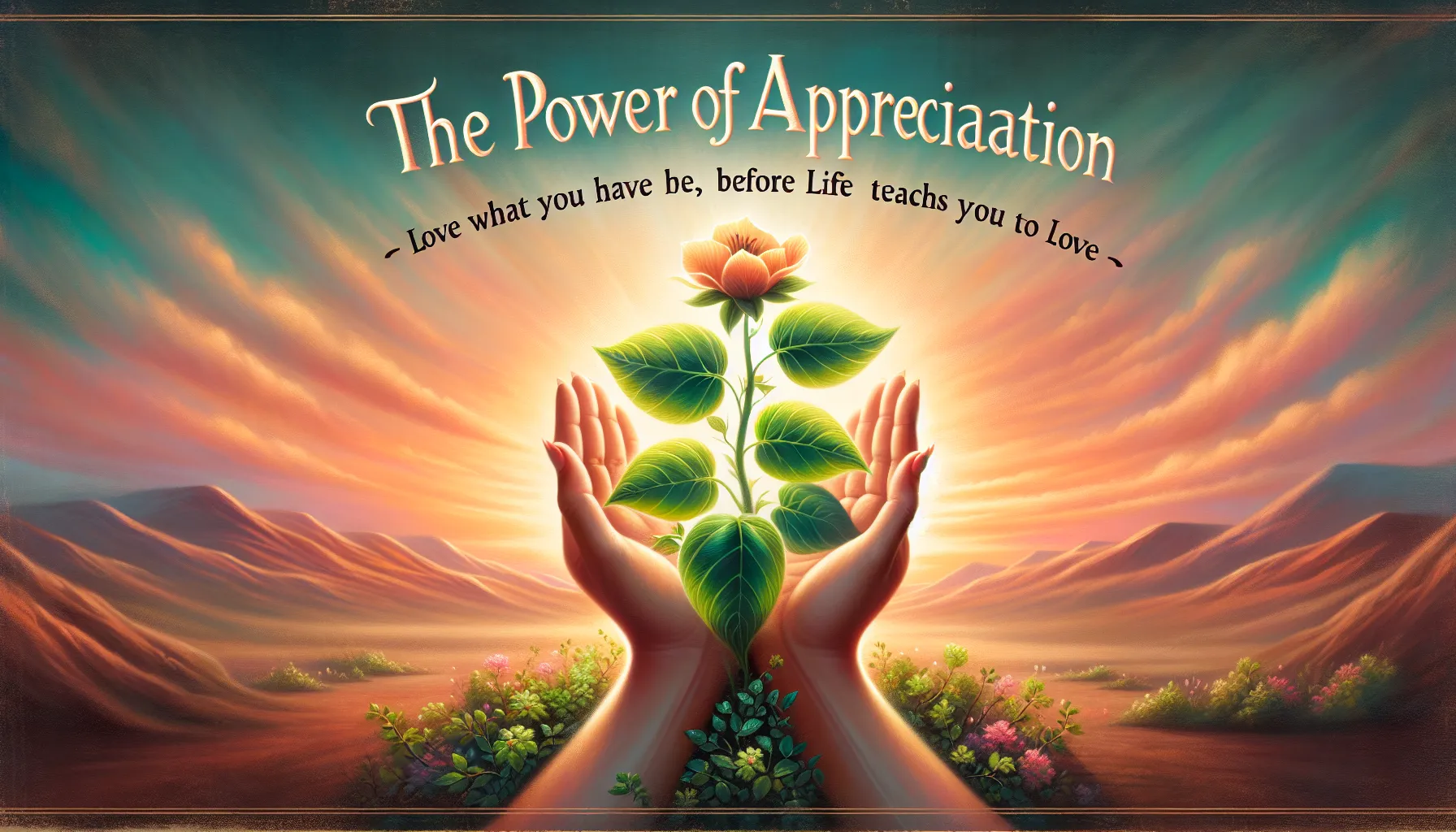Appreciating what we have, especially in the presence of relationships and personal achievements, confirms their value, enhancing satisfaction, performance, and well-being. This foundational principle of gratitude is not just a pathway to happiness but a necessity in cultivating a fulfilling life, a concept deeply explored in “
Love What You Have, Before Life Teaches You to Love
Tymoff
Through practicing and expressing gratitude, we not only elevate our sense of joy and self-worth but also encourage a positive shift in our interactions and perceptions. The article unfolds the essence of appreciating the present, the lessons learned from loss, and the steps towards leading a life rich in meaningful connections and moments, urging readers to start valuing what they have now, rather than learning the hard way.
The Essence of Gratitude
Cultivating gratitude is a transformative practice with profound effects on various aspects of life, from enhancing personal well-being to strengthening relationships and fostering a positive workplace environment. Here are practical ways and benefits of embracing gratitude:
- Practical Steps to Cultivate Gratitude:
- Mindfulness and daily reflection to acknowledge the present.
- Regular expression of gratitude towards others.
- Keeping a gratitude journal to record moments of appreciation.
- Embracing imperfection in oneself and life’s circumstances.
- Benefits of Gratitude:
- Leads to greater happiness and resilience.
- Strengthens relationships through sincere appreciation and goodwill.
- Increases employee engagement and commitment at work.
- Shifts focus towards positive interactions, significantly impacting long-term relationships and workplace dynamics.
- Gratitude in Spiritual and Religious Practices:
- Embedded in various cultural practices, gratitude is seen as an expression of loving kindness.
- Acts as a bridge to the Divine, emphasizing faith and trust.
- Encourages a posture of giving and openness, fostering collaboration and innovation.
Through these practices and understanding, gratitude emerges not only as an emotion but as a chosen attitude towards life, encouraging individuals to appreciate the present and recognize the goodness surrounding them, even in challenging times.
Learning Through Loss
Life’s adversities often serve as stark reminders of what holds value, urging us to reevaluate our priorities. This realization is poignantly captured in various personal narratives and initiatives aimed at navigating the complexities of grief and loss:
- The concept of “Grieving the living,” as discussed in “Grief & Mental Illness,” highlights the multifaceted nature of grief beyond physical loss. This perspective is further enriched by the author’s transformative journey following the profound loss of her son in 2020, underscoring personal growth amidst sorrow.
- The loneliness of grief is a shared sentiment, emphasizing the importance of acknowledging and honoring our past selves during tumultuous times. Engaging in random acts of kindness emerges as a therapeutic practice, offering glimpses of solace and optimism.
- Educational initiatives like the School Crisis Recovery & Renewal’s grief writing workshop and the Howard County Titans Football program’s emphasis on resilience, along with Learning Through Loss’s supportive services for grieving youth, illustrate the community’s role in fostering healing and personal development. These efforts, coupled with the solace found in literature like ‘Lament for a Son,’ showcase the diverse avenues through which individuals navigate and learn from loss.
Proactive Appreciation vs. Reactive Realization
In the journey of life, the distinction between proactive appreciation and reactive realization plays a pivotal role in shaping our experiences and well-being. Here’s a closer look at these two approaches:
- Proactive Appreciation:
- Definition: Actively acknowledging and valuing the positive aspects of life, relationships, and experiences.
- Benefits: Enhances overall well-being, and happiness, and fosters stronger relationships through consistent expression of gratitude.
- Outcome: Leads to a greater sense of self-awareness, personal growth, and resilience, enabling individuals to savor the present moment.
- Reactive Realization:
- Definition: Recognizing the value of something only after it is gone or taken away.
- Consequences: Often results in feelings of regret, sadness, and missed opportunities, with gratitude expressed in a manner that may feel insincere or forced.
- Impact: This can lead to dwelling on the past and a superficial understanding of one’s needs and desires, potentially causing individuals to miss out on current moments and opportunities for growth.
Understanding these dynamics encourages individuals to adopt a mindset of proactive appreciation, focusing on the present and cultivating a culture of gratitude. This shift not only enhances personal well-being but also strengthens relationships and builds resilience against life’s inevitable challenges.
Cherishing Relationships and Moments
In the realm of building and nurturing relationships, Dale Carnegie’s timeless advice from “How to Win Friends and Influence People” remains profoundly relevant. Carnegie emphasizes the importance of recognizing others’ accomplishments and expressing genuine gratitude. This principle is not just about enhancing personal connections but also serves as the cornerstone of effective communication and relationship building. By discouraging arguments and fostering active listening, Carnegie’s teachings guide us toward understanding and positively influencing those around us.
- Active Listening Techniques:
- Encourage others to talk about themselves.
- Listen with the intent to understand, not to reply.
- Show genuine interest in others’ thoughts and feelings.
From the personal reflections of individuals like Michelle McGee and Usman Ghani, who cherish the relationships and moments from their professional transitions, to the adventures of Jonathan Carter, who found closure and a renewed focus on the future through a backpacking journey, the value of cherishing relationships and moments becomes evident. These narratives underscore the transformative power of setting goals, embracing new challenges with determination, and the importance of finding joy and learning in every stage of life.
- Examples of Cherishing Moments:
- Michelle McGee values her military service relationships, viewing career transitions as opportunities.
- Usman Ghani appreciates the growth from relocating to a position that matches his skills.
- Jonathan Carter finds closure and future focus through backpacking the Continental Divide Trail.
Genuine appreciation, whether in personal or professional spheres, can significantly impact motivation and satisfaction. Recognizing someone’s efforts with heartfelt gratitude, as illustrated by the public acknowledgment practices of Leroy Jethro Gibbs from NCIS, not only boosts morale but also inspires others. This act of sharing appreciation serves as an effective mentoring strategy, fostering a culture of positive behavior and excellence in work.
- Strategies for Expressing Appreciation:
- Public acknowledgment of achievements to boost morale.
- Personalized gestures, like greenery-themed birthday invitations, to celebrate relationships.
- Incorporating lessons from visiting places like old age homes to learn and stimulate mentally.
Conclusion
Throughout this exploration, we have journeyed from understanding the profound value of gratitude in our lives to the revelatory lessons borne out of loss, urging a proactive stance towards appreciation. The contrasts between proactive appreciation and reactive realization have been elucidated, spotlighting the benefits of cherishing relationships and the myriad moments that define our existence. The article demonstrates that the foundation of a fulfilling life lies not in the grandiosity of achievements or the accumulation of material wealth but in the simple, sincere practice of gratitude, emphasizing its transformative power across personal well-being and interpersonal relationships.
The essential takeaway is the encouragement to cultivate a daily practice of gratitude, not as a response to what we fear losing but as a proactive acknowledgment of what we currently possess. Such a practice not only enhances our sense of joy but also significantly impacts those around us, fostering stronger connections and a supportive community. As we move forward, let us carry this understanding, taking steps to appreciate our surroundings, relationships, and achievements, thereby enriching our lives and the lives of those we touch. This journey of gratitude is not just a path to personal fulfillment but a communal voyage towards a more empathetic and connected world.
It seems there were no specific questions and answers provided in your request related to “The Power of Appreciation: Love What You Have, Before Life Teaches You to Love – Tymoff.”


